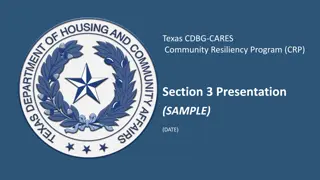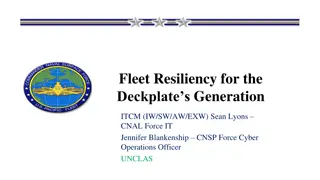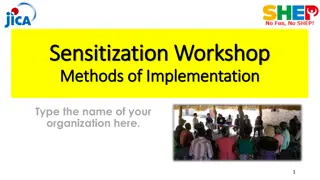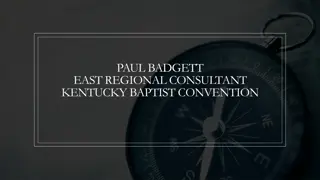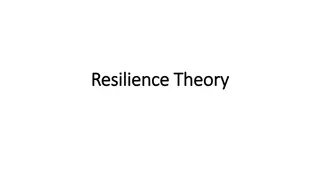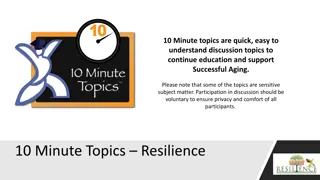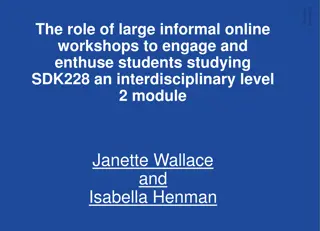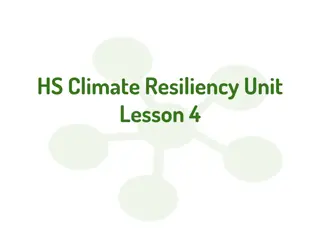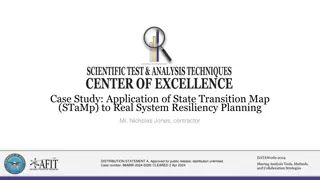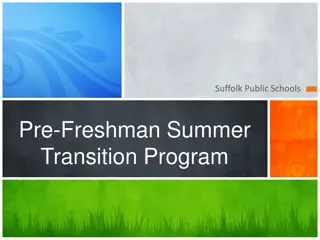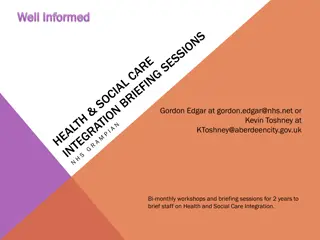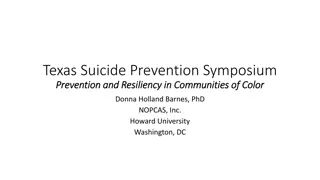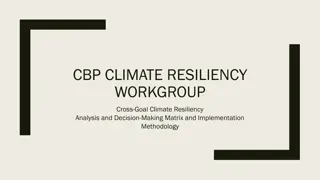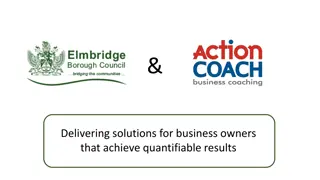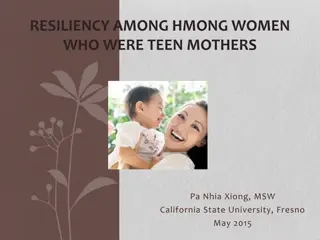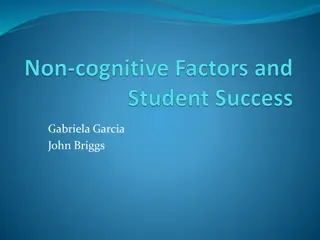Exploring Student Resiliency and Development in Education Workshops
Delve into the discussion on resiliency in students at the Surviving to Thriving Workshop. Topics include the Six Word Memoir, qualities of resiliency, student characteristics, and holistic approaches to building resilience.
Download Presentation

Please find below an Image/Link to download the presentation.
The content on the website is provided AS IS for your information and personal use only. It may not be sold, licensed, or shared on other websites without obtaining consent from the author. Download presentation by click this link. If you encounter any issues during the download, it is possible that the publisher has removed the file from their server.
E N D
Presentation Transcript
Gary Petiprin, Ph.D. Anne Bucalos, Ed.D.
Whats all this talk about resiliency? Have you heard of the Six Word Memoir? Let s try one on the topic of resiliency. In six words, write your take on resiliency on the card provided. Surviving to Thriving Workshop, 10.23.15
Context Why is this a hot topic? Why is it an issue on our campus? (some examples) Connection to student success Surviving to Thriving Workshop, 10.23.15
Who are our students today? Hyperconnected, yet insular Live alone together Used to oversharing Encouraged to stay as adolescents (particularly males) Want to be involved as co-decision makers, but reluctant to make decisions by themselves Aware of world issues and desire to do something about them Like structure, but want right of refusal Surviving to Thriving Workshop, 10.23.15
Lets think about what makes a student resilient What are some of the qualities, characteristics, skill sets, etc. that might describe resiliency in our students or that we want to build in our students? Surviving to Thriving Workshop, 10.23.15
Qualities & Characteristics of Resiliency Responding to adversity and challenge in an adaptive manner Not a static quality but something that can be learned and cultivated it s a process Quality of ordinary people Matter of degrees Surviving to Thriving Workshop, 10.23.15
Developing resiliency requires a holistic approach Relationships Mind Spirit/Values Body Emotions Surviving to Thriving Workshop, 10.23.15
I dont belong here Belonging uncertainty: Can I do this? Do I fit in? Events then affected by negative filter Avoiding Everybody s miserable at first! Short-term interventions that address belonging Preferably done by older peers Balance positive and negative Difficulty is normal and temporary Tell stories that emphasize growth (Social Belonging Intervention) Surviving to Thriving Workshop, 10.23.15
Values/Spiritual Practice Guiding students to consider vocation in addition to career .what do you want your life to represent 40 years from now? What will be your life s work in the broadest sense? Meditation Journaling/Reflection Value-affirmation intervention Surviving to Thriving Workshop, 10.23.15
Mindfulness Surviving to Thriving Workshop, 10.23.15
Self-Care Sleep Nutrition Exercise Surviving to Thriving Workshop, 10.23.15
Growth Mindset Failure as path to growth (vs. bad) Identity/Worth = Achievement Intelligence & competence as malleable (vs. fixed) Effort as path to mastery Learn from criticism Surviving to Thriving Workshop, 10.23.15
How can educators cultivate a growth mindset? Emphasize effort (vs. intelligence ) Emphasize learning vs. grades The great teachers believe in the growth of the intellect and talent, and they are fascinated with the process of learning. * Attitude of high standards AND nurturance commitment to teaching and belief in the capacity of each student to learn build this into instruction. *Dweck, C.(2007). Mindset: The new psychology of success. NY: Ballentine Books. Surviving to Thriving Workshop, 10.23.15
Mind: Using learner-centered pedagogies Involve students in goal setting, action plans, assignment choice (individual & group) Provide opportunities for practice with specific feedback (then wean from that) Use continuous reflection exercises on behaviors, beliefs, attitudes & perspectives (personal & group) Emphasize perspective-taking by assigning responses from different players Surviving to Thriving Workshop, 10.23.15
Solets try a Wandering Map Using the white paper provided, and the markers, crayons, and/or colored pencils, follow the instructions on the yellow paper Continue to reflect on what you have done: What were your primary themes? How are they important to you? What insights did you gain about yourself? Surviving to Thriving Workshop, 10.23.15
What is our role in cultivating resiliency? Helicopter Parent to Helicopter Professor! Scaffold feedback Encourage ambiguity Allow choice (and a bit of chaos) Increase accountability (don t rush to help before assessing the situation) Surviving to Thriving Workshop, 10.23.15
Summary Opportunities for service Activities for group interaction & belonging Self-reflection (values, integrity, optimism, stories of strength, competence and overcoming adversity) Cultivate growth mindset Cultivate grit Mindfulness activities Encourage wellness Surviving to Thriving Workshop, 10.23.15
Resources Resilience Consortium Harvard Success Failure Project The Stanford Resilience Project Vanderbilt Resilience Toolkit Vanderbilt Resilience Building Activities Cornell University Surviving to Thriving Workshop, 10.23.15
Centralized resource for wellness and resilience information vetted by Mental Health and Student Affairs professionals Holistic approach physical, mental, social and spiritual Student stories Linked to SuRF, Health Service, Counseling Center and Disability Services
Resources (additional references on handouts) Benard, B. at https://www.resiliency.com/free-articles-resources/the- foundations-of-the-resiliency-framework/ Berk, R.A. (2014). Last Professor Standing! : PowerPoint Enables All Faculty to Use Humor in Teaching. http://www.ronberk.com/articles/2014_HumorFinal.pdf Brown, S. (2008). A Buddhist in the Classroom. NY: State University of New York Press. Doyle, T., & Zakrajsek, T. (2013). The New Science of Learning: How to Learn in Harmony With Your Brain. VA: Stylus. Dweck, C.S. (2006). Mindset: The new psychology of success. NY: Ballantine. Eells, G. (Webinar available from Faculty Development Center) Creating Resilient Students: Strategies for Life-Skill Development. PaperClip Communications. Jay, M. (2012). The Defining Decade: Why Your Twenties Matter--And How to Make the Most of Them Now. NY: Twelve (Hachette Books). Surviving to Thriving Workshop, 10.23.15








